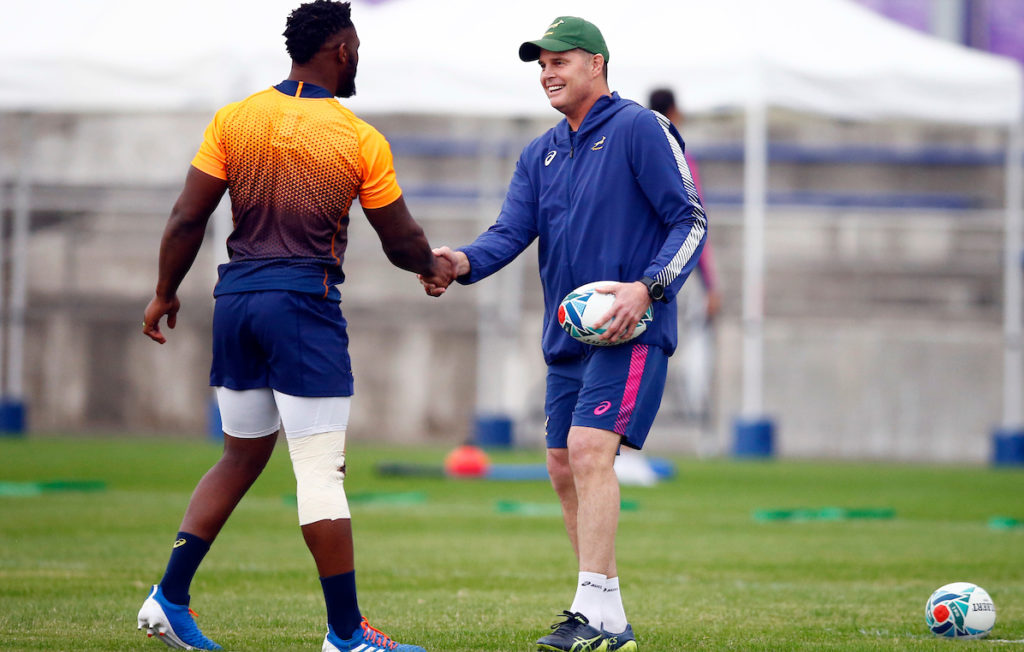Rassie Erasmus’ policy of transparency to the ever-sensitive subject of transformation was one of the most compelling reminders to come out of the first episode of the ‘Chasing the Sun’ documentary, writes CRAIG LEWIS.
Transformation, and the emotion that comes with the topic, is an ever-present part of the tapestry of South African rugby.
It’s something that has most closely followed the Springboks as rugby’s national flag-bearers. And Springbok coaches, since the inception of professionalism, have experienced vastly varied successes – or should that be failures – on this front.
For example, I’ll never forget how a colleague during the Heyneke Meyer era wrote a column highlighting his view that the former Bok coach was exhibiting an over-reliance on players he knew well from the Bulls, and less inclination to provide equal opportunities for other similarly talented players of colour.
That colleague was called to a meeting and asked to explain. Rightly or wrongly, it was a reminder that any attention around transformation would draw a sharp response. This was a topic that no one seemingly wanted to be discussed in the mainstream media.
It was something more commonly swept under the carpet, but yet the result was that progress faltered.
In 2016, former minister of sport Fikile Mbalula revoked SA Rugby’s right to host and bid for international tournaments after failing to meet its agreed transformation targets.
In releasing the Eminent Persons Group Report on sport transformation, it brought the need for targets to be met sharply into focus.
Yet it was something that some simply didn’t want to talk about.
But then, and with SA Rugby receiving clear directives to clean up its transformation act, Erasmus arrived and adopted an open-minded approach to this matter.
‘Our strategic goal for the squad was quite clear: winning, transformation, squad depth and experience,’ South Africa’s director of rugby shares in the premiere of ‘Chasing the Sun’.
‘The first leg was transformation, we said: “Guys, we are going to win but we are going to fix transformation.” Now I’m talking about black players on the field, and black management in the management, we’re going to fix that. Know it, we’re going to talk openly about that. People like to talk in the media about it, but the people that are actually impacted by it don’t talk about it.’
Legendary prop Beast Mtawarira then opens up.
‘Transformation was the big elephant in the room and every coach before Rassie was never addressing it properly. It was pretty difficult for players of colour, and for myself, for the first six years of my career I was predominantly the only black guy in the starting lineup. It felt a bit … lonely.’
These are words that should resonate.
It was also a sentiment echoed by Siya Kolisi, who reveals one of his biggest struggles as a ‘black Springbok rugby player’.
‘There were times [in the past] where I felt I was just in the team because of my skin colour and I hated it. The words that you get called, a “quota”. I worked so hard all my life, and gave my life to South African rugby and South Africa. That’s why I stay here, but then you get people calling you names like that.’
Kolisi adds that Erasmus was willing to talk openly, and in front of everyone about this subject, changing the perception about it being a ‘hush-hush’ topic.
‘We had to have the conversations, it was not going to change until someone had the balls to say “Let’s speak about it”.’
Erasmus then explains how there had to be a change in approach, banishing the feeling that people must be afraid to talk about the topic every time it came up.
‘How can you perform if you feel you’re there as a quota or the coach just has you there as a number, and doesn’t trust you? You become robotic in your moves, you’re not sure, it really just fucks up your game.’
Star wing Sbu Nkosi then adds: ‘He felt like transformation had been looked at as a headache, instead of a solution to a problem he thought was very much evident. He wanted to base his whole selection protocol on merit, which is only fair.’
Make no mistake, it’s an approach that was a game changer.
And even a year later, it’s a reminder of the values of inclusion, open conversation and transparency, which remain as pertinent as ever.
COLUMN: Ntunja’s magic moments will be missed
Photo: Steve Haag/Gallo Images





